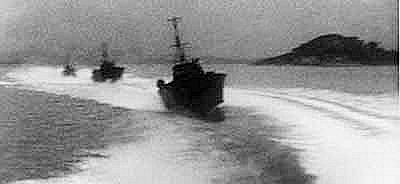28th December 1941 (Sun)
Ted Ross MoI "630 am - March - no breakfast
1030 am - Arrived Sah Hui & had cocoa & oranges in school - first sign of Chinese Troops." [28]
Ships Log "Up at 06.30. Hiked till 10.30‐‐‐‐feet giving trouble to many, including those that stuck it out the day before, when conditions were far more arduous. Moved into a school at Samshui where had first meal of the day‐‐‐‐cocoa & some oranges (which cost HK$1 each !)
Here were first signs of being in Free China‐‐‐‐advance elements of Yu Han Mou’s army." [5]
L/S Les Barker "Rose at 06.30 am and started our trek across country of all kinds. Just a rough track leading over plains and hills and sometimes through isolated villages with the inhabitants sometimes all turning out to see us all file past. Very monotonous, hour after hour, a lot of suffering from blisters and sore feet." [24]
Lt Kennedy RNVR "During the day of steady plodding along rough roads we passed through country showing fewer signs of Japanese influence." [9]
Lt-Cmd Gandy RN (Ret) "During one of the frequent ten minute halts I asked a young guerrilla girl what her parents thought of her present role. "I belong to the new China, but they do not," she replied. Several guerrillas suggested a pistol shooting competition at a crow obligingly perched on a tree two hundred yards away. "I took aim very carefully and squeezed the trigger. Puff! No explosion, only laughter from the guerrillas. My ammunition was faulty, having deteriorated with age. Mortifying of course, but perhaps just as well, because there were no more hints from the Chinese that their forces needed modern arms." [80b]
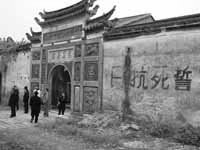 Eddie Brazel HKRNVR "We proceeded by way of Ze Shui to Sun Hui." [46]
Eddie Brazel HKRNVR "We proceeded by way of Ze Shui to Sun Hui." [46]
Admiral Chan Chak ROC "Despite my disapproval on being carried through the journey by 8 of Leung’s men, Leung did it anyhow. Leung led the group by heading into the Chinese government territory, Wai - Yeung.
When I insisted to walk, Leung made a wooden cane for me.
We walked past a number of sentries on the way and they were all in very good shape and order, I could see that Leung was a good military officer." [6]
Lt Kennedy RNVR "In the afternoon we began to see Chinese regular troops in their green cotton uniforms and padded jackets. We spent the night at their local headquarters." [9]
Cdr Montague RN (Ret) "We marched 16 miles to SAH HUI. Here we were within the lines of the Chinese Regular Forces, and owing to their kindness, were generously fed and comfortably housed." [1]
L/St Charlie Evans "We couldn’t even spend much time giving first aid to our sore feet, because we didn’t dare linger.
In one place the family had a farm and went to great lengths to provide a bath for me. When I finished I found I’d lost the other chaps, so one of the Chinese took me to the local army HQ and I found myself sitting down as guest of a lot of Chinese Majors and Colonels.” [12]
Ships Log "Set off again at 15.45, along flattish country, & as a result pace though faster, was easier. Just as night fell arrived at Chun‐Lung, where accommodation was provided in what appeared to be an old Temple.
Really good Chinese food provided by our kindly hosts‐‐‐‐plenty of variety & very hot." [5]
Ted Ross MoI "
345 pm - Moved on.
630 pm - Arrived Chun Lung. lovely old Chinese home with centre courtyard - converted into military barracks. Good meal , & wash.
Bed about 9PM." [28]
Colin McEwan SOE "Sun Hui proved a haven. We had our first meeting with the Chinese Army — smart, pleasant looking people who were down to meet the Admiral. We were given quarters in the local Chung Hok (Middle School) for the day and about 1 pm had our first meal since the previous evening. Since the village people were willing to accept HK currency (at 5-1) trade was brisk and John Collingwood earned my undying gratitude by the present of two great fresh duck eggs. After a very sound sleep we took the road again about 4.30 on a lovely afternoon. At dusk we reached our destination — Military H. Q. at Tsuen Lung the usual temple but spotlessly clean and with every preparation made for our comfort.
Dinner was a fairly hilarious affair with the General Staff proving a very poor second at lying on their bellies and grabbing at food with chopsticks." [11]
Here they slept in the temple within a walled Hakka village, now on the edge of Da Shanxia.
Lt-Cmd Gandy RN (Ret) “We had an elaborate meal of rice, pork and tea. I made the mistake of taking food from a dish of water-lily roots and felt extremely ill for the next two hours.
We slept in a dormitory of a Chinese military barracks which had a stage at one end, but no beds. My last recollection before sleeping was seeing Kendall playing the finger guessing game with Chinese General's for Yum Sing.
My next impression was a rude awakening when I fell off my bench.” [80b]
29th December 1941 (Mon)
L/S Les Barker "Up at dawn and off we go again (now I hate to hear this Ready to march) which our chief guide (Kendall) rings out enough to waken the dead.." [24]
Ted Ross MoI "Up at 6AM. Majority set off at 8 am in 4 separate groups to avoid planes. 40 odd bicycles." [28]
Eddie Brazel HKRNVR "We proceeded by way of Tai Shan Hai to Waichow." [46]
Colin McEwan SOE "Rumours of bicycle taxis for all of us were prevalent this morning but evidently it was not to be since, falling into separate groups in case of air raids, we moved off as usual. So still in my role of Commander of MTB 27 we started covering the road at a good heel and toe pace. Spirits were high and the mouth organ suddenly produced by Pony Moore lifted our feet along the moorland road we were covering. One very welcome halt we had at a wayside tea shop — later to prove a haunt of Tai's and mine where doughnuts vanished like snow off a dike'.
And so we came to Waichow — and halted on the outskirts for tea and cakes. While there we noticed a constant stream of Chinese soldiers passing through — Yu Han Mow's troops who were to have relieved HK and who were now on their way to Changsa where for the third time the Js were to be thrown back." [11]
L/S Les Barker "All the paths are terrible but we keep trekking along, hoping that the end means England. Consider ourselves safe now and party are a lot more cheerful today." [24]
PO Prest "Whenever we came to a village, dishevelled and without means, we were treated like Princes. The Chinese peasants gave us their huts to sleep in and shared their food with us. The only meat available for eating most of the time was bred and fed 'chow dog,' which was certainly more sustaining than the eternal round of rice and cabbage." [84]
Admiral Chan Chak ROC "I get up at 06.00 and plan to leave at 0700. I along with some British officers and man are sick because we cannot get used to the local environment. After marching for so many days our feet are aching and so we hired some coolies with bicycles to carry us. The grass is showing the first signs of spring." [6]
Bicycles had been sent 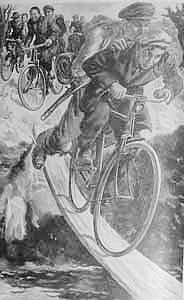 out from Waichow for the last ten miles into town, those that were still fit enough to march split up into four groups about one hundred yards apart because of the air raids.[28]
out from Waichow for the last ten miles into town, those that were still fit enough to march split up into four groups about one hundred yards apart because of the air raids.[28]
In scenes reminiscent of the now infamous 1936 Jarrow march, the remaining foot party set off for Waichow with Pony Moore playing moral boosting tunes like Sons of the sea and Beer Barrel Polka on his harmonica.
Ted Ross MoI "We were a bedraggled-looking lot.
Unshaven, uncombed, clad in odd bits of clothing picked up in the motor-boats. The worst of all was marching for days with old borrowed shoes that didn't fit. I was bitten from head to toe with vermin picked up in the filthy Chinese huts we slept in by day. Three or four of our chaps were ill, one with dysentery and another suspected of having cholera.
It was indeed fortunate we were travelling in the coldest part of the year, when disease was at its lowest ebb. We almost froze each night, but that was far better than falling sick.
Word had been flashed ahead we were coming and they sent a fleet of bicycles for us to ride the last fifteen miles. And were we glad to see them!" [28]
L/S Les Barker "Now nearing the outskirts of Waichow, which we are told is our first big stop and all looking forward to it. At about 1200 hours we stopped and were each given a half of one tinned sausage each. We were that eager to arrive in Waichow we were all for pushing on again. Soon after this, bicycles appeared ridden by Chinese youths and they took the ones who were most fatigued into Waichow. I had managed to stick it all up to now, so would not be beaten on the last lap and so stuck it into Waichow" [24]
Colin McEwan SOE "By this time feet and legs were going badly and the road tank trapped. Covered as it was with gravel offered little comfort to feet already tender from unaccustomed poundings.
Our next objective was always four miles away — cold comfort, having been informed that we were now clear, the advance party moved on to make arrangements while we acted as whipper's in at ...a pace of 2 mph.
The last 3 miles was a trial to the spirit and the flesh — tempers were getting short although the poor lads whose feet were worst trailed on with no complaint until in the end Tai and I decided to push on and get there. The arrival of the first bicycle taxis for those whose feet had suffered too much quickened our progress." [11]
Lt-Cmd Gandy RN (Ret) “This seemed a splendid idea, until we found the road was a frightful track and the bicycles were manned by pedalling coolies to take us pillion on the carriers. It seemed almost quicker to carry the coolies there, though conventionally infra dig. The pace was slow, there were too many stops at chasms and broken bridges to make riding anything but a succession of walks and wobbly rides.” [80b]
Ships Log “Cripples” and certain others on whom the forced march were beginning to tell were taxied all the way on the padded pillion seats of 40‐odd bicycles‐‐‐‐an amazing sight!" [5]
Lt Kennedy RNVR "It had been an easier day as half the party had covered the last ten miles on the pillion seats of bicycles. Those of us who walked had our gear carried by coolies." [9]
Ted Ross MoI "What a reception! Word had been flashed ahead we were coming and they sent a fleet of bicycles for us to ride the last fifteen miles. And were we glad to see them!" [28]
Maj Goring BHQ "Presently we came to some enormous cavities extending right across the road, tank traps some fifteen feet deep, and half filled with water. As we approached the first, I was horrified to observe that my cyclist did not slacken speed; he obviously intended to pedal across the narrow plank which spanned the gap! I protested violently, but he rode doggedly on. "This" I thought "is the end; once down at the bottom of that tank trap, nothing will ever get me out again!" I shut my eyes; I honestly believe my cyclist did the same. Yet, the moment we reached terra firma on the far side, the Chinese wobbled worse than ever!" [17]
Not all had such good fortune.
Sub-Lt Legge HKRNVR "I gave them my ex-gas mask container in which I had been carrying the few valuables that I had managed to rescue from the boat. My camera, about 300 postcard enlargements (the result of a year’s work in Hong Kong), my fountain pen, diary, passport, the photos of all the family and some spare socks and cigarettes and matches. I never saw them again nor could I trace them at all." [18]
PO Prest: "We travelled by cycles, but mostly we walked. It was a case of march or die"
Ted Ross, peddling the wounded MacDougall, arrived at the gates of the walled city of Waichow, now Huizhou, several hours before the main party. Mac was questioned by the local press who got the brief account off to Chunking in time to make front page news around the world the following day.[14]
PO Stonell (MTB 11) "Out of 32 who started the 15 mile walk to Waichow only 9 finished. It was just British grit and a mouth-organ." [112]
Admiral Chan Chak ROC "We arrived at the outskirts of Waichow at 13.00 where we were met by Director Chen and the local Mayor, Mr Wang, and other senior officials. We drank some tea and talked about how we fought in Hong Kong and how we escaped before marching to the commanders centre in town." [6]
Ted Ross MoI "I pedalled Mac & arrived Waichow (Col. Chauvin) 1.30 & had excellent tea & cakes. Mac & I went ahead by bicycle into Waichow about 2PM." [28]
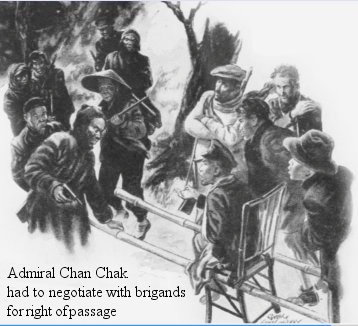 Lt Kennedy RNVR "The air-raid warning was in force when we arrived there, we had to wait outside the town for the all clear. It was four O'clock when the trek back to the town began, and we prepared to make a formal entry." [9]
Lt Kennedy RNVR "The air-raid warning was in force when we arrived there, we had to wait outside the town for the all clear. It was four O'clock when the trek back to the town began, and we prepared to make a formal entry." [9]
F W Kendall SOE "The Chinese guerrillas looked after us and got us through the Japanese lines up to Waichow which was then in Free China." [67]
The main party finally arrived at the outskirts of Waichow with its giant pagoda, which had stood in one form or another for a thousand years, dominating the skyline, at about four o'clock. There were plenty of fly ridden tea and snack stalls set up taking advantage of the constant stream of refugees fleeing the Japanese aggressors. The ancient city of Waichow had become an important river port after the Japanese blockade of Canton, and was a major supply port of war materials for the Chinese as well as importing smuggled western goods overland from Hong Kong.
After a short respite it was time to fall in and march through the massive city gates [66]
Lt-Cmd Gandy RN (Ret) “We fell in, in as orderly a manner as possible now that the eyes of the Chinese soldiers were upon us.” [80b]
Lt Kennedy RNVR "We formed up into a column four abreast, determined to show a sprightly step as we marched behind the Admiral. Chan Chak seemed to be enjoying the show immensely and sat smiling in his chair, as standard - bearers fell in on either side of him with the Chinese flag and the White Ensign." [9]
PO Stonell (MTB 11) "We had but gone 200 yards when we had to dive again because of planes, but only for five minutes, then we got under way again. But what a step, for a few minutes all over the place, but once started it was hard to tell." [112]
Ted Ross MoI "A small force of Chinese troops was drawn up just outside the city to salute us as we came by and I don't mind saying I was never so glad to see a Chinese soldier." [28]
Admiral Chan Chak made a triumphant entry into Waichow with Lt-Cmd Gandy and his Ships Company who had fulfilled their obligation to deliver the Chinese Adm and his staff into Free China against all the odds, following the fiasco in Aberdeen Channel.
Kelly & Purchase, the two youngest members of the party carried the White Ensign and Chinese National Flag either side of the Admiral and the town Mayor [24] . Leading Seaman Ernie AKA Pony Moore playing his harmica with a host of ratings using their combes wrapped with tissue paper accompanying him as they marched into town past the Chief Magistrate and Deputy Garrison Commander Major-General Loh Mau Fan, amidst firecrackers and all the noise the locals could muster.
L/S Les Barker "On arrival we were met by Chinese army officials at a building just outside the army
barracks and just outside, passing through at the time were gray clad troops with full equipment, We watched these for a full hour as we were given Chinese tea and sweet cakes which we ate heartily, everybody being hungry after our march. We were told that this army that we were now watching file past, was the army which was on their way to relieve Hong Kong and, if we could have held out for about another two days, these troops would have begun to have an effect upon the Japanese attacking Hong Kong." [24]
Lt Kennedy RNVR "A host of dogs and small boys appeared from nowhere and kept pace beside us. The crowd increased, cheering as we went by, and fire - crackers cascaded onto the street. This barrage exploding under our feet made it hard to preserve any semblance of military order, but who cared ?" [9]
Colin McEwan SOE "Then came our parade into town — a long procession in columns of three — in the front Chinese and British flags — officers on the flank beside their
crews — trying manfully to keep them in step. Impressive it may have been — certainly the town turned out to watch — but the general impression it gave me — slinking along in the rear and beginning to realise how dirty I was — was that of a Salvation Army Saturday night route march just at closing time.
In addition to this I felt an irresistible urge to giggle and in this was not helped by the fact that the mouth organ band was playing the 'Beer Barrel Polka' followed by Macmillan's rendering of 'I don't want to be a soldier' while striding along with a definitely martial air." [11]
The city had an apocalyptic feel about it with bombed and burnt out buildings and rubble strewn streets. The Japanese had committed atrocious atrocities after occupying the city, murdering anyone of a fighting age. Thousands had fled as refugees, and the whole city had a somber air about it.
Lt Collingwood RN "Eventually we arrived in Waichow, a very poor town which had suffered much from the war. It had changed hands several times and the Japanese had burnt most of it." [8]
Colin McEwan SOE "The town itself having been occupied twice [by the Japanese] consists mainly
of wooden buildings in the main street and the usual narrow cobbled back streets." [11]
Ted Ross MoI "The whole city was a wreck. Bombing after bombing had produced rows and rows of burnt-out streets, and all the bridges were down. There were no roads or railways serviceable for transport." [28]
Admiral Chan Chak ROC "Along with several British officers and men I was taken to the "Wai On Hospital" for treatment. It was decided that I should get treatment for my wrist in Shaoguan where they have better facilities. " [6]
The Japanese had withdrawn its troops to invade Hong Kong and now the Chinese National army was in occupation. Here the party rested for two days at the "Wai On Hospital" complex established by the American Seventh Day Adventist. Located by the river, the walking wounded were treated by Doctor So and his staff. The complex had over painted the stars and stripes on the bungalow roofs with dark paint after the Japanese declared war on the USA. [43]
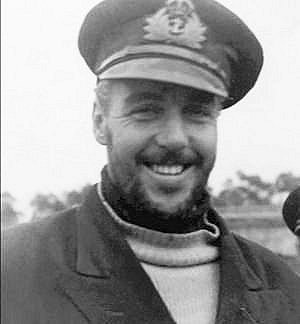 (Paul Tsui. BAAG) "For the Officer's Mess, we negotiated with the management of the Seventh Day Adventist Mission to rent one of their 3 two-story bungalows within the campus of the Wai On Hospital. Up till December 1941, the campus flew an American Flag, and had a large Stars and Stripes painted on top of the roofs of the 3 bungalows, to warn the Japanese aircraft not to bomb the properties. The painted flag had been over-painted with black since Pearl Harbour was bombed. It was a nice campus, with grass-lawns and open space on one side of the Chapel. The Hospital was on the other side of the Chapel." [34])
(Paul Tsui. BAAG) "For the Officer's Mess, we negotiated with the management of the Seventh Day Adventist Mission to rent one of their 3 two-story bungalows within the campus of the Wai On Hospital. Up till December 1941, the campus flew an American Flag, and had a large Stars and Stripes painted on top of the roofs of the 3 bungalows, to warn the Japanese aircraft not to bomb the properties. The painted flag had been over-painted with black since Pearl Harbour was bombed. It was a nice campus, with grass-lawns and open space on one side of the Chapel. The Hospital was on the other side of the Chapel." [34])
(The Ministry) "Dr and Mrs Y C So have also rendered a great service at the Wai On Hospital in Waichow. Though regular means of communication with Waichow are cut off, still Doctor and Mrs So and a group of faithful workers remain at their post and are working beyond their strength to care for the sick and needy. Doctor So serves as medical adviser to the relief committee of the city.") [41]
They had then covered some 80 miles which had cost Leung Wingyuen thousands of Kuomintang $ in bribes to the Communists, bandits & brigands through the lawless Communist held country.
That evening a banquet was laid on and hosted by Mr Chen who was accompanied by two Army Officers. The meal consisted of Chicken, Duck, Pork and much more washed down with an endless supply of illicit rice wine, 'sham shui' with many toasts of 'kan-pei or yum sing.'
Admiral Chan Chak and his ADC Henry were put up in downtown Waichow by city officials.
Although rice wine was illegal in China as the rice was needed to feed the starving peasant population it was available along with most luxuries on the black market, normally served in ornate porcelain tea sets for disguise.
Lt-Cmd Gandy RN (Ret)"The local Army General (Lt-Gen Wang Dafu) entertained us to a vast Chinese banquet of chicken, duck, suckling pig and other meats, all of which was gobbled down with chopsticks or a small china spoon. One of Lieutenant-Commander Yorath's remaining possessions, a spoon taken from the Hong Kong Club, came in useful." [80b]
Lt Kennedy RNVR "The hospital which had been started by the Americans and presumably still run from their funds was entirely staffed by Chinese.
They (Chinese National Military) gave us a magnificent feast in true Chinese style with apparently unlimited courses. Pigeon's eggs, bamboo shoots, suckling pig and an unending variety of dishes followed each other onto the table in rapid succession. We sat with our hosts at round tables in groups of eight or ten, and using chop - sticks and bowls helped ourselves from central dishes. Many resorted to more primitive methods and used their fingers. Our hosts helped by putting morsels of food into our bowls with their chop - sticks.
The meal ended at last after countless toasts had been drunk in rice-wine. " [9]
Lt Collingwood RN "We were given our first official welcome and dinner. Chinese officers were very keen to make friends. We stayed here for two days at the American Mission Hospital." [8]
Admiral Chan Chak ROC "Mr Chen accompanied by two Army officers invited all of us to an evening meal which was deliciouse, the best meal we have had since escaping from Hong Kong ." [6]
Colin McEwan SOE "Quarters were found in the local mission hospital and after the luxury of
a real bath we were entertained to dinner and wine by the local H.Q. where it
was again proved that the Navy cannot be beat — Ronny Ashby by some form of
magic appearing in collar and tie and looking like a very senior Rear Adm.
And so to bed— real beds — and sleep, real sleep." [11]
Although rice wine was illegal in China as the rice was needed to feed the starving peasant population it was available on the black market along with a lot of luxuries, it was normally served in ornate porcelain tea sets for disguise.
30th December 1941 (Tues)
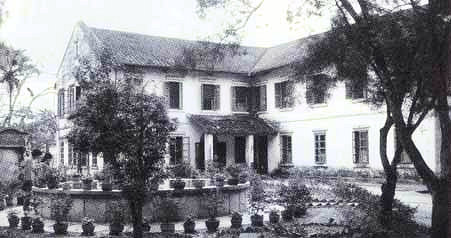
Breakfast was a simple affair with rice, fish & ducks eggs, with some of the odds & sods party members volunteering to serve and do general galley duty. Cdr Montague had the White Ensign to go alongside the KMT flag for the group photo to be taken afterwards. The Chinese Majors were all sporting white gloves, a legacy of Chiang Kai-Skek's Japanese military training. The Iconic Waichow Photo was taken by the local photographer with his last glass plate. Admiral Chan Chak sat in the centre surrounded by his band of British "Lo Hons."
L/S Les Barker "We stayed at the American Mission and it was outside this building that a photograph was taken of the party. I shall always keep this photograph as a souvenir. There are 65 of us pictured – a motley company wearing all kinds of clothing and uniforms. Quite a lot had steel helmets. But throughout the march I wore a sweater (originally white), blue trousers and a couple of shirts. I had no hat." [24]
Adm Chan Chak "I arrived back at the hospital at 10.00 and was given a big, warm welcome. Everybody received some gifts including hand towels before having our picture taken for our commeration." [6]
Following the Iconic photo shoot the Chinese started shouting "Ching Pao Ching Pao," (air raid air raid) as a Japanese plane circled lazily above without dropping any ordnance.
A service in the Mission's chapel followed with the Europeans in the pews on one side and the Chinese on the other.
Colin McEwan SOE "There we were packed in the church — British on one side, and Chinese on
the other. Up rose the Major and in a flow of impassioned oratory informed all
and sundry that ABCD was the stuff, that
Japans days were numbered and that soon under the Generalissimo etc etc." [11]
Lt- Cdr Gandy RN (Ret) "The pulpit was first occupied by a Chinese official whose pep-talk we did not understand,he called for the Chinese National Anthem for which we all stood up, and hummed the tune. Commander Montague spoke next and expressed our thanks to the Chinese for their kindness and generosity, despite the Japanese who had bombed much of their fine city." [80b]
Cdr Montague RN (Ret) "However it will be rebuilt, once the barbarians are defeated; Chinese and British alike are now joined in the common task of defeating the aggressor." [80b]
Mike Kendall in an unreachable falsetto led a rendition of the National Anthem accompanied by the ratings using their combs wrapped in toilet paper as harmonicas in support. [11]
Lt- Cdr Gandy RN (Ret) "We then all lustily sang “God Save the King”, one verse only, our memories not being up to standard.
Our hosts seemed pleased and chatted cheerfully as they left the church." [80b]
Lt Kennedy RNVR "Speeches of welcome were made by the Chief Magistrate and another local dignitary in Chinese and were quite meaningless to the majority of us, but they managed to convey a spirit of friendliness all the same. There was tremendous enthusiasm as Admiral Chan Chak rose to reply. A recurring phrase in his speech which sounded like A-B-C-D-goga was greeted each time by a burst of applause from the audience, and we could safely guess that he was referring to the new combination ranged against Japan, the American-British-Chinese-Dutch alliance." [9]
The A.B.C.D. that the Chinese were praising was a secret society set up by Chan Chak, following advice from David MacDougall, on 11th December. It was the A.B.C.D. Chinese Corps Hong Kong, numbering some fifteen thousand men under the disguise of the Zhongyi Charitable Society based at Happy Valley. Henry Hsu was the fixer keeping the various Triad factions focused on working together against the common enemy, the Japanese infiltrators and Chinese fifth columnists whose senior members were interrogated then summarily executed upon capture. Chan Chak referred to them as the loyal and righteous, they assisted the emergency services, organised food distribution, acted as bodyguards for senior figures as well as extracting many V.I.P.s from Kowloon. They proved to be an invaluable source in assisting in civil law and order.. [6]
Ted Ross MoI "Chapel Ceremony and gift of Biscuits cigarettes, oranges, cakes, tinned milk, & face towels. Pictures in morning." [28]
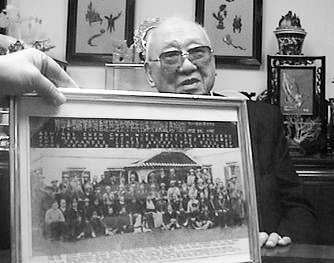
Admiral Chan Chak produced much appreciated funds for the party, Kuomintang$100 for each of the officers and a mess fund for the ratings. Gandy ordered all weapons to be cleaned. After inspection the weapons were formerly handed over to the Chinese military, thus bringing to a close the guerrilla operation the 2nd MTB Flotilla had been tasked with. Chan Chak then arranged for the weapons to be given to Leung Wingyuen's band of Guerrillas along with funds as a thank you. [6]
Left Henry Hsu in 2006 admiring the Lo Hons who escorted Adm Chan Chak and Henry to freedom in 1941..
Shore leave was granted to the Ships Company for the remaining daylight hours, they found the prices were high in Waichow.
Admiral Chan Chak "At lunch time I received a telegram from General Yu Hanmou, I returned a complimentary telegram to Yo as well as initial reports of the escape to Chungking." [6]
Ted Ross MoI "Mac (David MacDougall) and I made for the wireless station just as soon as we found out where it was, dashed off a cable each, it cost me four hundred dollars and when we got the bills later we almost collapsed. Of course we had nothing like that amount with us and had to borrow from the Admiral." [28]
Lt Kennedy RNVR "Wires between Waichow and Chungking were busy passing the names of our party to the British Embassy, and making preliminary arrangements for the journey ahead." [9]
Ted Ross MoI "Mac had stood the trip remarkably well. It amazed me how he ambled on mile after mile with that bullet in his back and with the original dressing still on. There was only one Chinese doctor in the town, and after messing around for some time until he almost had poor Mac fainting, he announced he couldn't find the bullet and we would have to carry on to another city about five days away. The Admiral's arm was beginning to swell, and he was feverish; but they could do nothing much for him either, except change the dressing." [28]
Lt Kennedy RNVR "During the day Waichow was dead. All shops closed at the first [air-raid] warning, and the townsfolk out into the country, to return again before dark and conduct their business in the evening." [9]
Admiral Chan Chak "At 13.00 we took a rest before we went to the market where there was feverish activity to buy provisions. " [6]
Colin McEwan SOE "Prices in the shops were high — much too high for our shallow pockets and soon
we were back in the hospital." [11]
Ships Log "Pirate cigarettes Kuomintang$1.40 for ten, life buoy soap $1.70 a tablet, sweatshirts $32, to quote a few random examples." [5]
Oliver Lindsay Author "Everyone was surprised to see a tall, unmistakably British Colonel mysteriously dressed in a padded gray Chinese coat which reached his ankles. It transpired that he was Lieutenant-Colonel Chauvin who was with the Military Mission to China. The Colonel arranged with the Chinese for everyone to travel along the East River to Leung Chuen - almost two hundred miles to the north-east. Boats had to be chartered to carry the party." [80b]
31st December 1941 (Wed)
Colin McEwan SOE "During the morning I had the opportunity of attending a ceremony I had heard
about but imagined was extinct — Mike and Leung becoming blood brothers. We had a qualified practitioner scraping the
arms with a scalpel after disinfecting the skin — a slight graze — the 2 arms
pressed together — application of iodine and here the ceremony was completed
and over unless, as Mike suggested later, some syphilitic blood had been
transferred to him." [11]
The party marched down to the floating pontoon at 18.00 where two motor house boats [MHB's] known as Walla - Walla's by the locals were alongside. They were powered by Ford V8 car engines converted to run on charcoal gas, with sampans in tow. They were about seventy feet in length. With much chaotic shouting the MHB's finally let go and proceeded against the fast flowing current of the mighty East River to Lungchun.
L/S Les Barker "Left Waichow at 6.15 pm on Chinese riverboats, one house boat towing a junk. I am in a junk with 15 others, no modern conveniences, just enough room to sleep on straw. It was very cold at night. We have one petty officer (Prest) on the boat which is towing us who is ill with dysentery, hope he soon recovers as we have no official doctor on board." [24]
Leung Wingyuen once again accompanied the party in order that he could be presented to the military local HQ in Kukong for formal recognition as a pro-Nationalist guerrilla leader. An official military escort was detailed to protect Admiral Chan Chak and his party against any mischief by the notorious river pirates.
The three S.O.E. agents waved bon voyage before returning to the mission in preparation to celebrate News Years Eve in traditional style.
Bill Robinson Police Supt "A grander trio of reliable crooks I never expect to meet."
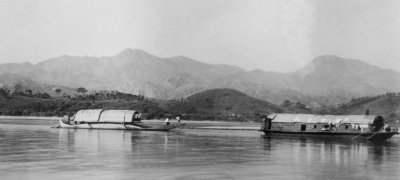 The MHB crews were from the ancient Hoklo race, boat people with their own dialect which nobody could understand. Soon the giant pagoda of Waichow was lost to site as the MHB's chugged north-eastwards up the river.
The MHB crews were from the ancient Hoklo race, boat people with their own dialect which nobody could understand. Soon the giant pagoda of Waichow was lost to site as the MHB's chugged north-eastwards up the river.
The boats had a bamboo frame covered in a rattan canopy, open fore and aft. The heads, or latrines consisted of two planks outboard at the stern with no hand rails, it would take a very desperate man to use them. The boats were very crowded with the crew's of MTB's 07 & 09 in one Sampan, and 11 & 27 in the other with the rest in the MHB's. The sampans were open ended and it was bitterly cold with the north-east wind whistling through.
"The captains signalled to the primitive boiler-room by pulling a string which agitated a bunch of rushes; the number of swishing, rustling noises indicated the power required." [80b]
1st January 1942 (Thurs)
The British press ran the escape details including where and when they landed in Mirs Bay just days before. [93]
This unfortunate over site by the press continued throughout their entire journey to Rangoon compromising the escape party all the way.
Lt Kennedy RNVR "The motor-boats looked like Noah's Ark's and were 'powered', to use an inappropriate term, by ancient charcoal-gas engines. In the Sampans it soon became intensely cold and screens of straw matting rigged up in the bows did nothing to prevent the wind from sweeping along the boards on which we sat, envious of those in the motor-boats who at least derived warmth from the engines. The engines broke down repeatedly and first one boat and then the other had to tie up to the bank.
This was the only part of the journey when food was difficult to get, and two small bowls of rice were our portion for the day, but we felt that any hardship now was a small price to pay for having escaped imprisonment." [9]
The motors were very unreliable especially Chan Chak's MHB.
Maj Goring BHQ "The boats were large sampans, with grass thatched roofs pitched so low that it was impossible to stand upright inside. The Admiral had forbidden us to leave cover, because streams of Japanese aircraft passed overhead from time to time. Our gas-coke motor, a converted Ford V8 engine which had once seen service in a private car kept blowing up or breaking down; and there were constant stops while we were levered off sandbanks. There was very little room left to lie down, and the business of fitting all the bodies into the floor-space for sleeping at night presented quite a problem." [17]
2nd January 1942 (Fri)
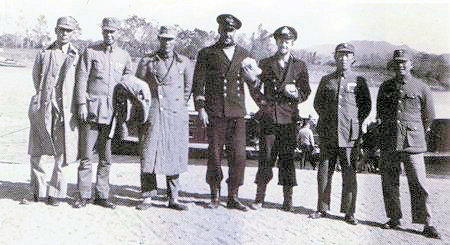
Ships Log "Early in the morning, 07 & 09 transferred to motor boat, & sampan cast off. Somewhat cramped quarters, but warmer & pleasanter! Better progress made without tow, but engine still broke down frequently. At about 1pm stopped at Goonyumkok where practically all went ashore & stretched their legs – only a small town, but quite a quantity of toffee, oranges, etc was purchased. Continued up‐river after some 30 minutes, fewer breakdowns, but more frequent groundings on sandbanks." [5]
Maj Goring BHQ "The scenery, which was all there was to look at was magnificent, and the occasional halt at some village always provided adventure." [17]
3rd January 1942 (Sat)
Ships Log "Arrived at Hoiyuen around 02.30am ‐‐‐‐‐‐ had we arrived there early the previous evening (as expected) a big dinner would have greeted us, but this was off. V2s (Cdr Gandy)boat alongside at 03.15, he woke everyone up & then continued on, still towing 11 & 27 (MTB crews)in the sampan. At dawn, a motor‐houseboat arrived from Waichow & 07 & 09 (MTB crews) were transferred to it. Much better boat‐cleaner, faster, better services & really good food. At 2.30pm caught up Yeu Hop with V2 (Gandy) & took onboard 11 & 27 (MTB crews). All three motor boats continued in company, anchoring below Liesing’s sandbanks at about 9pm." [5]
After Hoiyuen the countryside changed from uninteresting flatlands to very picture postcard mountains with pretty villages and bamboo groves with men sitting on small rafts fishing with cormorants.
Lt Kennedy RNVR "At places the river became very shallow and the boats frequently grounded on the sandy bottom. This aroused the crew to bursts of unwonted activity and they appeared on deck in surprising numbers armed with poles. With much shouting and gesticulation they then proceeded to push and heave until the boat came clear.
Many of us started diaries when we had long hours during the day unoccupied, many of us started diaries to record the events of the previous month while memories were still fresh. As it had naturally not been possible nor permissible to put anything on paper at the time." [9]
(Colin McEwan SOE On returning to collect the heavy weapons in the new year [11]
"On arrival at Namo, however, where the half sunk MTB's were still
visible.
The night was spent in the guerilla G.H.Q. where we acquired M.T.B.
beds, 'Three Castle' cigarettes, and an excellent dinner before going to sleep."
4th January 1942 (Sun)
L/S Les Barker "I am in a junk with 15 others, no modern conveniences, just enough room to sleep on straw. It was very cold at night and fairly warm during the day. We are running aground every few hours which calls for the Chinese crew to beat us clear with bamboo poles.The scenery is very good on both sides. Stopped because Japanese aircraft were sighted and proved hostile, but passed out of sight and so we took this opportunity to stretch our legs for half an hour. We embarked again, and this was after a farmer chased us away for stealing his sugar cane. This was very refreshing." [24]
5th January 1942 (Mon)

While still ahead of the Admiral’s MHB they met the six foot three inches tall Lt-Colonel Harry Owen-Hughes, the 'Tai pan', towering over his Chinese colleagues. He had left Hong Kong on the last plane out, and was now staying at the Mission in Kukong. Owen-Hughes was seconded as liaison officer to the 7th Chinese Army under Gen Yu Han Mow, and met the party just before Longchuan.
He had been charged with organising transport through Southern China. He also had much needed funds which meant the party were less dependent on local hospitality as well as arranging Chinese army padded jackets and eiderdowns (mingtois) for the party.
Maj Goring BHQ "At length we arrived at the town of LeungChuen, where we were hailed by a British officer, Harry the Tai Pan, who had been sent down from the Military Mission in Chungking." [17]
Harry joined the MHB for the last few miles up the river to Lonchuan. The provincial military Governor had arranged a welcoming party with troops lining the riverside with paper flags on bamboo sticks in the barrels of their rifles. Lt-Col Owen-Hughes along with the two Generals from Kukong then proceeded back down river in the Walla - Walla to find the Adm. The four MTB crews formed up and marched into town to a firecracker & dog barking welcome.
Sq-Ldr Max Oxford RAF "We had considerable engine trouble on the river and averaged about one mile an hour, my boat was much overcrowded with Chinese troops and guerillas all living with us in a single large room and on the whole I was glad to leave the boat." [30]
Ships Log "Proceeded up‐river again at dawn. Just before the sandbanks, most of the motor boats passengers were put ashore & they walked up to Luising on foot which lightened the motor boat, after much sweating, & strains, & being helped bodily on occasion, got over the sandbanks. Our boat led the way, finding the best route, & we arrived at Luising first, running into the welcome intended for the Adm! On again at 10am‐our boat, others not having arrived‐to Lungcheong.
Here we were met by Lt‐Col Owen Hughes. 07, 09, 11, & 27 marched in without waiting for the others, & again drew welcome intended for the Adm‐‐‐‐a terrific barrage of fire‐crackers. Troops parked in Middle School, Officers in hotel‐very comfortable.
Parade held on square, in which local General made a speech welcoming the “Hero’s” from HK. Adm Chan gave a resume of events in HK, while Cdr Montague made a brief speech of thanks. Dinner then given in our (Interpreter could not pronounce heroes, so called us heels) honour by the people of the town (pop=300.000), good spread‐a whole cow killed in our honour by special dispensation, as cattle can normally be killed on the 5th, 15th, 20th, 25th, & 30th day of the month." [5]
Ted Ross MoI "And so we went slowly along, until on the fifth day we came to quite a village where the first motor road linking with Free China began. Here again we had a great reception. After a huge dinner provided by the community, speeches were made from a platform draped with British and Chinese flags. Beef is scarce, and by government decree can be killed only three times a month; but by special dispensation they were allowed to kill a cow for us and, boy, it was good." [28]
Sub-Lt Legge HKRNVR "The firecrackers were more of a trial than any of the bombardments in Hong Kong, especially when they kept landing down our necks, setting our bedding alight and generally deafening us."
It was some time before the Adm's Walla Walla arrived, and the Admiral was quickly got ashore and whisked off in a makeshift sedan chair before the remainder had stepped foot ashore. [18]
Lt Collingwood RN "After four days proceeding up the river, we landed at Longchuen and we marched through the town. There were fire crackers to welcome us, speeches were given in the town square and we gave Hong Kong hails." [8]
((((Captain Hewitt)))) "Longchuen turned out to be a small, well-kept town, with wide tree-lined streets, lotus ponds, tea shops and restaurants." [66]))))
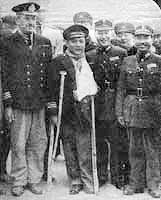
As usual large crowds gathered, with the children looking on in awe, for they had never seen westerners before. A large dais had been erected with images of Chiang Kai-Shek & Sun Yet-Sen on the plain close by, known locally as the "Great Place," and a civic reception was arranged for early evening. A couple of small hotels were available for the officers, with the ratings billeted in the Middle School where the students were given a day off.
Long speeches were made and at the end of proceedings both the Chinese and British National Anthems were sung. There upon three thousand Chinese bowed themselves to the ground before the portraits of their two great leaders. Fearing that the traditional three cheers might frighten the locals. Chan suggested to Monty they bow back three times in Chinese fashion.
Maj Goring BHQ "The Mayer came forward and requested that the Distinguished Foreigners face the assembled multitude, as the populace of Longchuen wished to bow to them. Cdr Montague ordered "Ship's company Shun!" Thereupon three thousand Chinese bowed themselves to the ground." [17]
Lt Kennedy "Our senior officer ordered, "Party will about turn and bow to Chinese Allies." [9]
The navy party looked at each other perplexed, and Commander Montague in age old navy dialogue which they well understood encouraged the ship's company to bow, and bow they did, low.
With arms folded in Chinese style the navy party duly bowed three times, much to the delight of their hosts, and wry smiles from the rest of the party.
Maj Goring BHQ "Never before, surely, in the long history of the Royal Navy, has such an order been given, or so magnificently carried out." [17]
The town was given special dispensation to slaughter a cow which they can only normally do on certain days of the month. After an eventful five day river journey, on a meagre diet of two small bowls of rice per day, and with many engine breakdowns they made the most of it.
L/S Les Barker "We walked through the streets as honoured guests to our billets, accompanied by the noise of the traditional fire-crackers which the Chinese always let off on special occasions. Then we proceeded to the town’s main eating place where the British party and all the towns’ prominent officials were given a big dinner consisting of ten courses. Each member of the party was presented with a Chinese army jacket with the compliments with Leoung Chung. The students of the local school gave up their sleeping quarters and bedding for the comfort of the visitors" [24]
(Colin McEwan SOE On returning to collect the heavy weapons in the new year [11]
"The first entry in my Field Diary reads 'Looks as if we are getting somewhere' but
it was another case of our not yet appreciating how things are done in China. Awakened, we fed on cocoa and soda crackers, followed by a meal of sausages, tinned soup and cold salmon. For a moment I actually felt grateful until I
remembered that this, after all, was part of the stores that we were there to collect.
After breakfast we slid off to view our stores and began (and as it happened later finished) by viewing the 'radio'. They were OK but, 'Where,' said we, 'are our guns?' Oh, the guns. Yes, the guns. 'Ah, yes,'said the guerilla Number One.'There were guns, weren't there? But now very secret place'. 'Oh yes' said we, 'show us the place'. 'Oh belong very far walk'. 'Can do,' said we, gallantly sacrificing
our feet for king and country. 'More better not, only two piece man savvee, belong very secret,' and so, after arguing fruitlessly for an hour and finally succeeding in extracting his promise that the guns would be delivered to us the night we would be ready to leave, back we went to Namo and, after seeing that our food stores, which, although sadly depleted, were there, sat down to (await?) the return of the Shataukok envoy. Still no news and after a most boring evening to bed."
The party were very thankful for the clothing that Lt-Col Owen-Hughes had got them as it was winter and getting colder. Duggy Pethick and Eric Cox-Walker were admitted to hospital possibly suffering from Pneumonia.

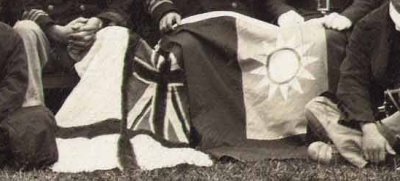
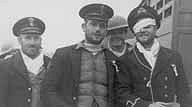
 Eddie Brazel HKRNVR "We proceeded by way of Ze Shui to Sun Hui."
Eddie Brazel HKRNVR "We proceeded by way of Ze Shui to Sun Hui."  out from Waichow for the last ten miles into town, those that were still fit enough to march split up into four groups about one hundred yards apart because of the air raids.
out from Waichow for the last ten miles into town, those that were still fit enough to march split up into four groups about one hundred yards apart because of the air raids. Lt Kennedy RNVR
Lt Kennedy RNVR (Paul Tsui. BAAG)
(Paul Tsui. BAAG) 

 The MHB crews were from the ancient Hoklo race, boat people with their own dialect which nobody could understand. Soon the giant pagoda of Waichow was lost to site as the MHB's chugged north-eastwards up the river.
The MHB crews were from the ancient Hoklo race, boat people with their own dialect which nobody could understand. Soon the giant pagoda of Waichow was lost to site as the MHB's chugged north-eastwards up the river.


